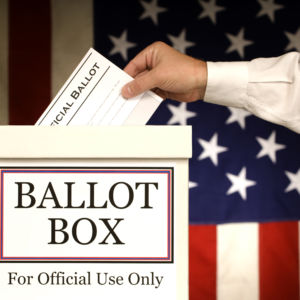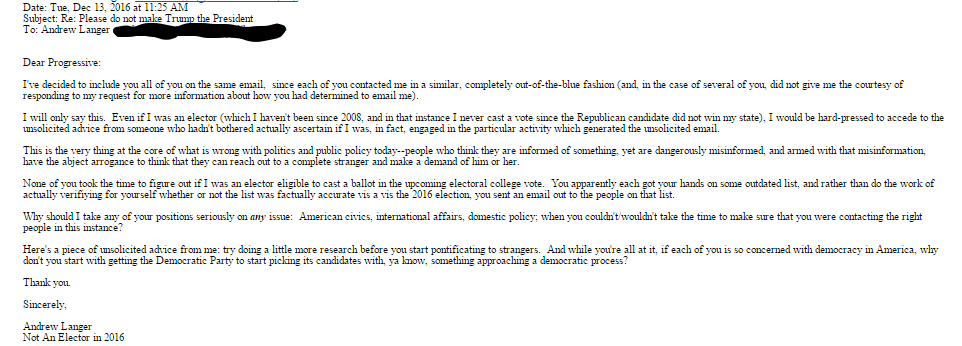Andrew Langer has not been a part of the electoral college in years but that hasn’t stopped some from demanding he not vote for president-elect Donald Trump.
Langer was nominated to serve on the electoral college in Maryland eight years ago. The electoral college is a process in which representatives from each state choose the president. Langer started to receive emails demanding he not vote for Trump, from people who were apparently unaware he is no longer in the electoral college.
“I will only say this,” Langer responded to critics in an email. “Even if I was an elector…I would be hard-pressed to accede to the unsolicited advice from someone who hadn’t bothered to actually ascertain if I was, in fact, engaged in the particular activity which generated the unsolicited email.”
Langer received three emails thus far and expects more to come. Maryland Republicans nominated him to be an elector just once during the 2008 election. Nevertheless, his one-time entry into the electoral college was enough to put his contact information on a now outdated database.
“None of you took the time to figure out if I was an elector eligible to cast a ballot in the upcoming electoral college vote,” the email went onto say. “You apparently each got your hands on some outdated list, and rather than do the work of actually verifying for yourself whether or not the list was factually accurate vis a vis the 2016 election, you sent an email out to the people on that list.”
Langer wouldn’t have much say anyway even if he had been an elector this year. Electors are nominated by their parties, and they do not vote in the Electoral College unless their party’s candidate wins their state. Langer never cast a vote when he was an elector because then-candidate Barack Obama won the state of Maryland. Likewise, he wouldn’t cast a vote this recent election because Democratic candidate Hillary Clinton won the state.
Langer added the demands highlighted a fundamental problem with politics today. He notes people make demands to others based solely on misinformation. The issue wasn’t even the request in itself but that it was from people who didn’t even bother to figure out whether they were reaching out to the right person.
“I think it’s everyone’s right to reach out to someone who has taken on a public duty,” Langer told InsideSources. “But I think what it underscores is when you do reach out to elected officials or people in positions of responsibility, you need to approach it from some level of actual education. Everyone is entitled to their own opinions. No one is entitled to their own facts.”
The founding fathers established the electoral college as part of the U.S. Constitution. It was a system derived as a compromise between those who wanted a congressional vote and those who wanted a popular vote. The system has received fierce criticism this past election since it can undercut the popular vote.
“There are folks that want to see the election results undone by any means necessary and going after the electoral college and attempting to delegitimize the electoral college vote is one of the ways folks are going to do this,” Langer said.
The electoral college consists of 538 electors with a candidate needing a majority of 270 electoral votes to become president. A state is given electors equals the number of members in its congressional delegation. Trump was able to surpass the majority threshold to defeat Clinton.


